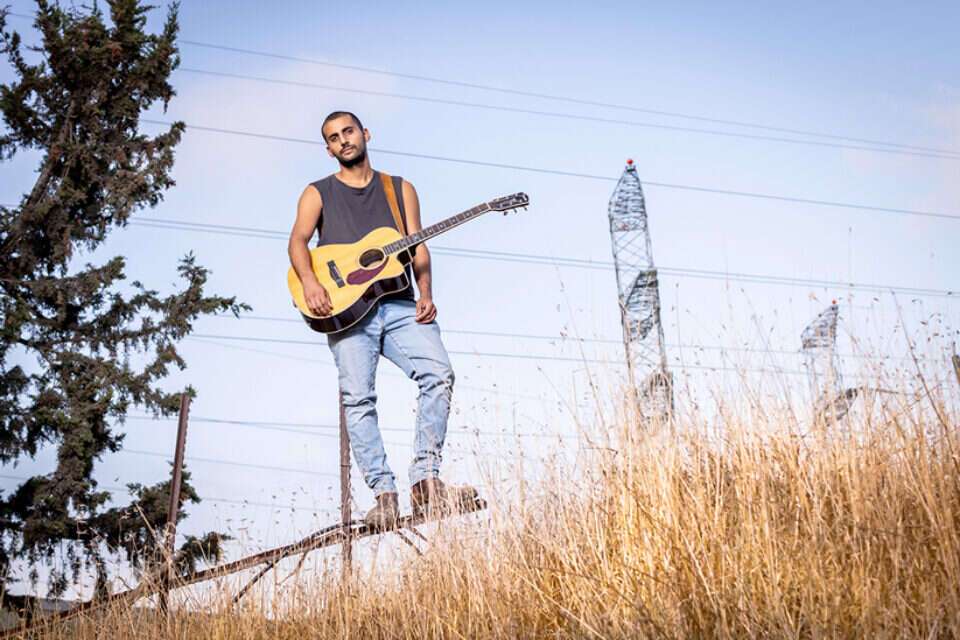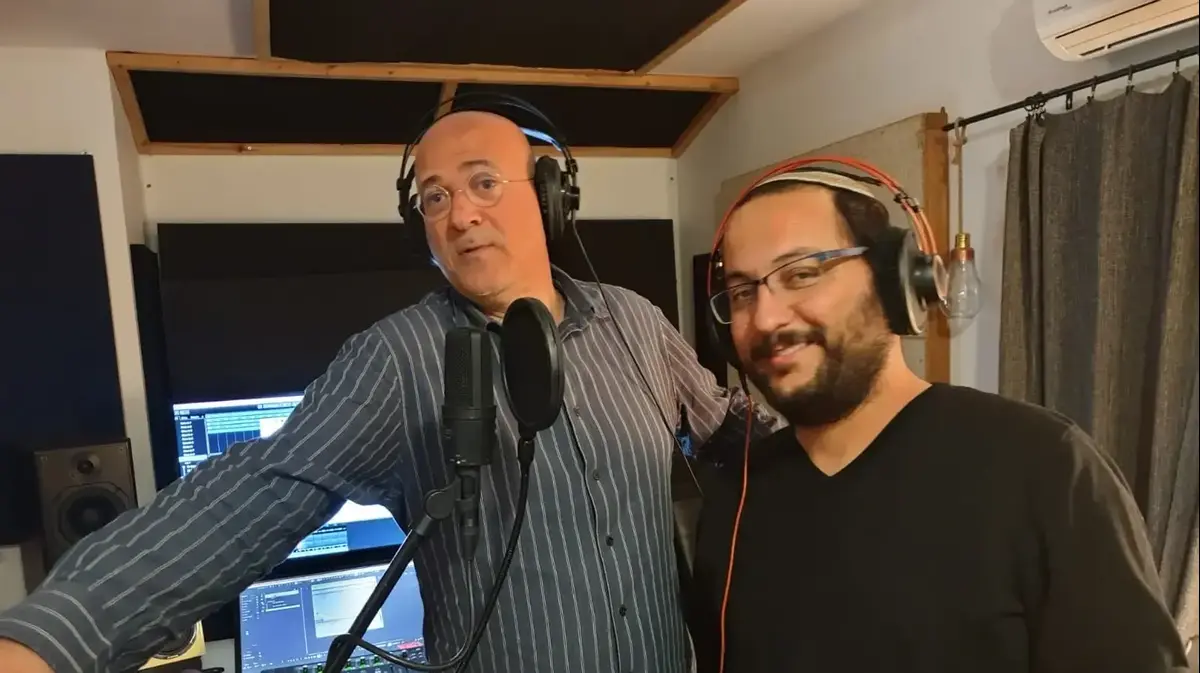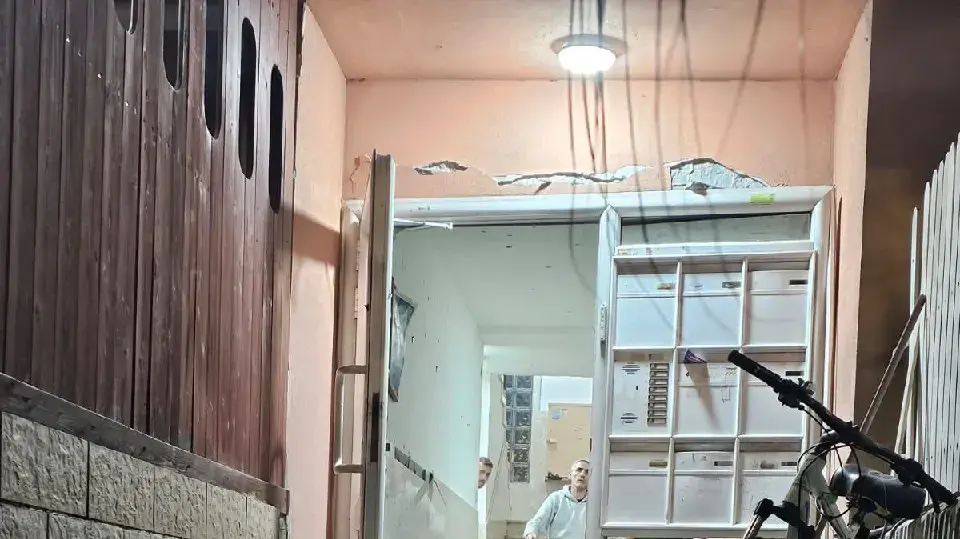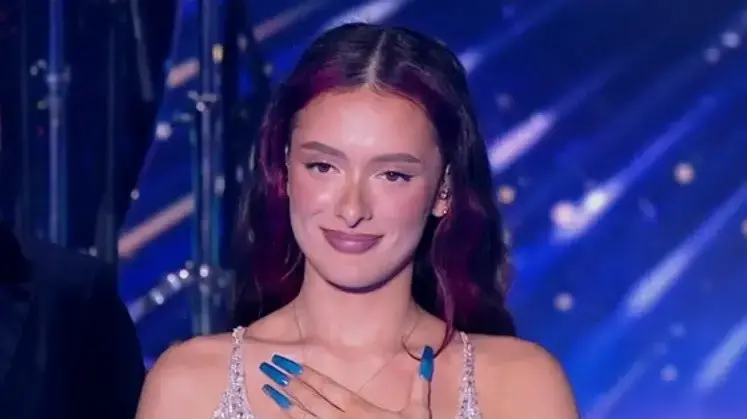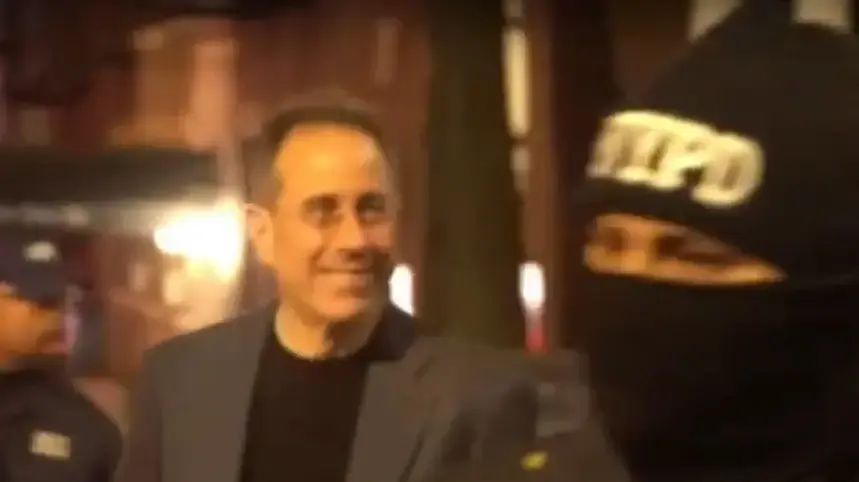The trauma struck Amri Karwani in July 2016, when he was serving as a company sergeant major at the entrance post in Hermon.
"There was a grenade explosion in my company, and a lone soldier I commanded from the beginning of the route, the late Sergeant Shlomo-Zalman Rindnau, was killed.
Along with him, Sergeant Hossam Tapesh was also killed, and other soldiers were wounded."
The disaster, which apparently happened as a result of human error, happened at the gate of the outpost.
"I was awake, when I suddenly heard an explosion. I thought it was an anti-tank missile fired by ISIS members, who had been warned about their activity at the time.
I ran outside, reached the gate and started evacuating the wounded.
I saw all the horror before my eyes, and it tore me apart.
Shlomo was a lone soldier, without family in Israel, and I was responsible for him.
I evacuated what was left of my soldiers from there."
The trauma and its severe consequences accompany the 29-year-old Karwani to this day, as well as his days fighting in Gaza in Operation Protective Edge, two years earlier, and his service during the Knife Intifada in Hebron.
Years later they will reflect and influence his debut album, which was recently released.
He was born in New York, where his parents lived for a short time, and from the age of one until he graduated from high school he grew up in Moshav Aniam in the Golan Heights.
"As a child I was raised on the Beatles and Queen, and at the age of 16 my parents encouraged me to take guitar lessons. I would buy a lot of CDs, listen to a lot of rock, Nirvana and Israeli rock, Assaf Amdorsky, Aviv Geffen, Monica Sex. I really admired Kurt Cobain. I really connected to his lyrics , to Zeka. He sings about loneliness and being different from the environment, and about the importance of remaining who you are, and in adolescence it suited me very well. I try to take this message into my music and what I present. Avitar Banai also had a great influence on me. His first album goes with me until today and influenced me. He is very rare."
Two months after he started learning to play he was already performing, and hasn't stopped since.
"In the beginning I performed rock, blues and country covers, from Amir Dadon and Idan Reichel to Bill Withers. I would perform in a pub in the Golan Heights, and at the same time I found a farm with friends, we brought equipment and we would perform there in front of dozens of people. We did it once every two weeks for several years." .
The performances that moved him the most, according to him, were actually on the street.
"Before the army, I did a year of service in the Talfiot neighborhood of Jerusalem, as part of the religious-secular youth organization 'Tzmarat.'
"The feeling of being a foreigner in the big city made it possible to do what I wanted, and the performances on the street really freed me. Sometimes my apprentices would see me there, but I was proud of it, because suddenly you make a passing child dance or an old man happy. I would earn a few tens of shekels each time , pocket money that suited me."
Thanks to the street performances, his name reached the casts of musical reality shows.
"They called me several times to invite me to auditions. I didn't go because I didn't feel ready. Every year I get a call again, I'm probably in their database. Nowadays it's less appealing to me, but I'm happy with the success of people like Eliav Zohar, who studied with me in the second grade Pomegranate'".
in the military service.
"I touched the pain aggressively", photo: Shani Nitzan
"I realized that I live with a problem"
He joined the army in November 2013, for combat engineering.
On the day the route ended, he was stationed at the Gaza border.
"I participated in Operation Rock Ethan, in the north of the Gaza Strip, in the Jabaliya sector. We were very active, in contact with the enemy, and also in handling the tunnels. We fought right there. I was in danger dozens of times. My force blew up the last tunnel in Gaza. It was a long operation, with Uncertainty. On 'Black Friday', when the late Lieutenant Hadar Goldin was kidnapped, we thought we would stay there for a long time.
"I think that on a solid cliff I very quickly turned from a child into a man who gets the real thing. I mostly had a hard time with the destruction I saw around me, but I was very alert and did what was necessary. I slept with my helmet on inside the APC.
My friends had a harder time.
Some have been affected for years and some in trauma.
It's a whole cycle that accepted the events straight ahead."
The next event that affected him occurred in the south of Mount Hebron during the 2016 stabbing intifada. The late Dafna Meir was murdered, in January 2016, it happened right next to us.
I was a police officer, which is a very lonely position. Somehow I got out of there without falling apart.
"When the day of my release approached, they really wanted me to make a decision, for me to stay, but I couldn't take it anymore. I just wanted to run away. Two days after my release from the BKK, I already flew to India for eight months."
Did India help you?
"I had a good experience. Most of the time I traveled without Israelis. I had my own felt. I was in the ashram for two weeks. I studied meditation and yoga very intensively, from four in the morning until night. For me it was the beginning of self-healing. A moment of disconnection from Israeli society and from where I was. To this day, meditation and yoga help me to return to the earth and rebuild myself, not to be a broken vessel."
In India he also returned to music.
"I started writing songs there, at the age of 23, but I was very worried that it wouldn't sound good and that the people around me wouldn't like what I was doing. When I returned to Israel, I studied tour guiding and worked at the Jerusalem branch of the hummus chain and a bar. I held down three jobs at the same time, but I also found time for music and returned to performing All this despite the fact that I was afraid to be exposed, I was afraid to go all the way.
"I worked at the hummus chain for a year as a cook, I would grind the hummus and add their secret spice compound. Then I got an offer from them to work in the US, to manage their restaurants there.
I have an American passport, and I decided to use it.
In 2018, I flew to New York, and trained teams to work in their branches.
I had a friend in Jerusalem, and she flew with me to New York.
That's also where we parted."
He lived in downtown Manhattan and worked on music with Omer Mor, who is known as "Itzik Bomzati".
Together they wrote songs and made arrangements and music production.
"In general, I didn't have a good time in New York, I felt bad there. I lost energy from the loneliness and the cold of the city. I was there in a struggle to survive, and the prominent song that played in my head was 'Losing to New York' by Monica Sex. My goal was not to lose to the city, to beat it , and I tried hard for her not to beat me. So to speak, on the surface I beat her, because I managed quickly, I made a good living and I had friends, but inside I really wasn't happy."
When did you decide to come back?
"There was an evening of Israelis, who invited me to perform in front of them, and some guys who heard me expressed an interest in helping me and connecting me with people from the music world. Then I realized that I wanted to sing in Hebrew and do it in Israel, and I returned from New York after a year.
"In Israel I realized that I was living with a problem. Suddenly I didn't recognize myself. I turned to Netal (an association that provides support and psychological assistance to victims of terrorism and war in Israel - AN) for psychological treatment. I have been receiving treatment from them for three years, understanding where I was, what I've gone through, where I am and where I'm going. I realized that I'm injured and in the process of rehabilitation."
What did you actually feel?
"That I'm not good with myself. That my head is a place where I suddenly don't know how it's going, and what's going on in it is very bad. I felt that it's not pleasant for me to be in this situation, that I can't live like this anymore, that I'm really suffering."
what hurt you
"Something cracked in my perception of the world. The Amri before the army and after it is not the same person. My head worked differently. My problem was that I did not understand the change, and I could not accept it. The first Amri feels a sense of belonging, happy, sociable. The second Amri feels very lonely, Even if he is in a very supportive company. He is alone in his experience, and no one can understand him. The experience he went through is still alive in him, and no one understands what he is talking about and what happened to him."
What about your friends from the army?
"I went through three companies during the service, in each one I had different experiences. In the grenade incident in Hermon, half a company was not there when it happened. The friends were very sorry to hear, but they were not there with me, in the field. I have the feeling that I was there alone, and I am the loneliest in the world."
How does what you've been through come into your music?
"At the same time as the treatment I underwent, I started writing the songs that went into my debut album. Most of them were written in 2019-2020, in conjunction with the treatment. Writing helped me deal with the pain. Creating the songs was a very, very healing experience for me.
"In songs, I could say things that could not come out of me in any other way, not even in psychological therapy. For me, music is a spiritual experience in which I feel truly free. I can say difficult and embarrassing things through music, and this gives those who hear the songs inspiration and relief."
at the show
"There are songs where it seems like I'm singing about love, but I'm actually talking about the trauma", photo: Daniel Friedman
"Wants big shows"
Karwani's album, "Been Ha'atsafot", includes ten songs, most of which he wrote and composed.
He talks about two main topics: dealing with the traumas he went through in the army and trying to heal from them, and dealing with unrequited love, which he experienced at the same time as the mental process he went through.
"There are songs where it seems like I'm singing about love, but I'm actually talking about the trauma or the post-trauma," he explains.
When you make an album, you mess with each song over and over again. Didn't it bring you back to the trauma?
"On the contrary. For example, a song like 'Take care of me'. I sang it on recordings dozens of times, and when working on it in the studio I listened to it hundreds of times. It means that I touched the pain in him in a very, very aggressive way, but for me it was healing. I think that you need to touch the pain, to recognize In his existence, to know that he exists."
Did the trauma strengthen or weaken your faith in God?
"An interesting question. I was less connected to God, even though at home with my parents we study the Bible and chapters of Avot on Fridays.
In the album, I sing the 'Psalm to David', which I used to recite without even noticing whenever I was in danger.
It's because my parents taught me what he says.
That's why he also entered the album.
In his performance I shout.
And 'keep me safe' is a prayer, a cry for help to God, because I'm already in a situation where I don't know who to turn to.
There my voice broke.
In the last song, 'Sing to you', we recorded it very raw, in one take, you can hear the movements of my mouth there."
And what about the relationship?
"Until after the army, I was very shy, even hiding. When I perform, I express things, but without the guitar I prefer silence. In fact, I am still shy. With the girlfriend who moved with me from Jerusalem to New York, it ended there. In retrospect, I realized that my mental struggle affected the loss of my partner . I felt that it didn't work out because of me, and I blamed myself for the failure of the relationship. Today we are completely fine, we have come to terms with the breakup."
How did the house get into the album?
"Near Aniam there is a spring, and I added elements of nature and water in the album. The song 'Baadinot' opens with the chirping of birds, to put the listener in the atmosphere."
What are your ambitions for the future?
"To live from music, and it is possible. I want to go to big concerts. My band and I recently finished a round of ten concerts a month across the country: Tel Aviv, Jerusalem, Haifa, Rishon Lezion, Binyamin, the Golan Heights, kibbutzim, Zichron Yaakov. There are places where A relatively large audience, and I see that they know the songs, mainly from social networks. I earned money from these performances from which I was able to pay the musicians. In total, I have invested several tens of thousands of shekels in the project to date."
How are you really on social media?
"I upload content to Instagram and TikTok, videos of 20-30 seconds with music, in the background of which I say inspiring texts. For example, from Buddhism, how to stop and rest from stress. And people connect to it. They distribute my content to their followers, and that's how they reach me and the songs Mine has more surfers. I'm very happy that it's happening, because it's important to me to inspire people. For example, to flood the issue of post-trauma and military service."
In recent years, artists such as Idan Amadi and Raviv Kanar have flooded it.
"True, it exists, but I still felt lonely in my experience. I really like Amadi's era and I was also influenced by it. In my opinion, it is important to continue talking about the issue so that something happens. I love the country very much, and it was important to me to serve in my country, but I have a feeling that a little We are being left behind. I think we should be taken care of even after. I want to say this from my experience, so that it reaches people. It is important for me to put it on the table."
"In my songs, I put things out of my mouth that wouldn't have come out of me in any other way", photo: Eric Sultan
"I don't hang out much"
He is the second of four brothers.
The eldest works in high-tech, another brother in plastic arts, and the young man finished a trip after the army.
His father, Haim, has a carpet factory, a laundry and a fire retardant business in Katsrin.
His mother, Shulamit, is a marriage and family therapist at a mental health clinic.
He himself lives in the heart of Tel Aviv, in a tiny rented apartment, without electricity in the stairwell, a meter from the mythical Shinkin Street.
The apartment has a small home studio, where some of the album's songs were recorded.
As someone who grew up surrounded by greenery and nature, how do you manage in Tel Aviv?
"I don't spend a lot of time, although I recently went to the concerts of Avitar Banai, Tuna and Teddy Ngusa. For a living, I have been taking care of trees for the past two years, in a company that provides services to the Tel Aviv municipality. This includes pest control, pruning, and more. I work from Gilolit Junction to Holon Junction, along and across Knows every inch of the city.
"Before the corona virus, I worked in the management of the show bar 'Bar Giura', until during the corona virus I realized that I needed a job where I continue to work even during closures. I am a person who works non-stop. I hardly ever take time off, and everything I earn is invested in music."
Do you have time between all these for a partner?
"Not at the moment. I've been single for a long time. I don't mind. If it comes, it comes. I'm not working on it. I have no problem talking about the music, but if someone wants to sit down with me for coffee, I'll tell her that I'm less free. I'm very busy Currently in music".
asafnevo444@gmail.com
were we wrong
We will fix it!
If you found an error in the article, we would appreciate it if you shared it with us

